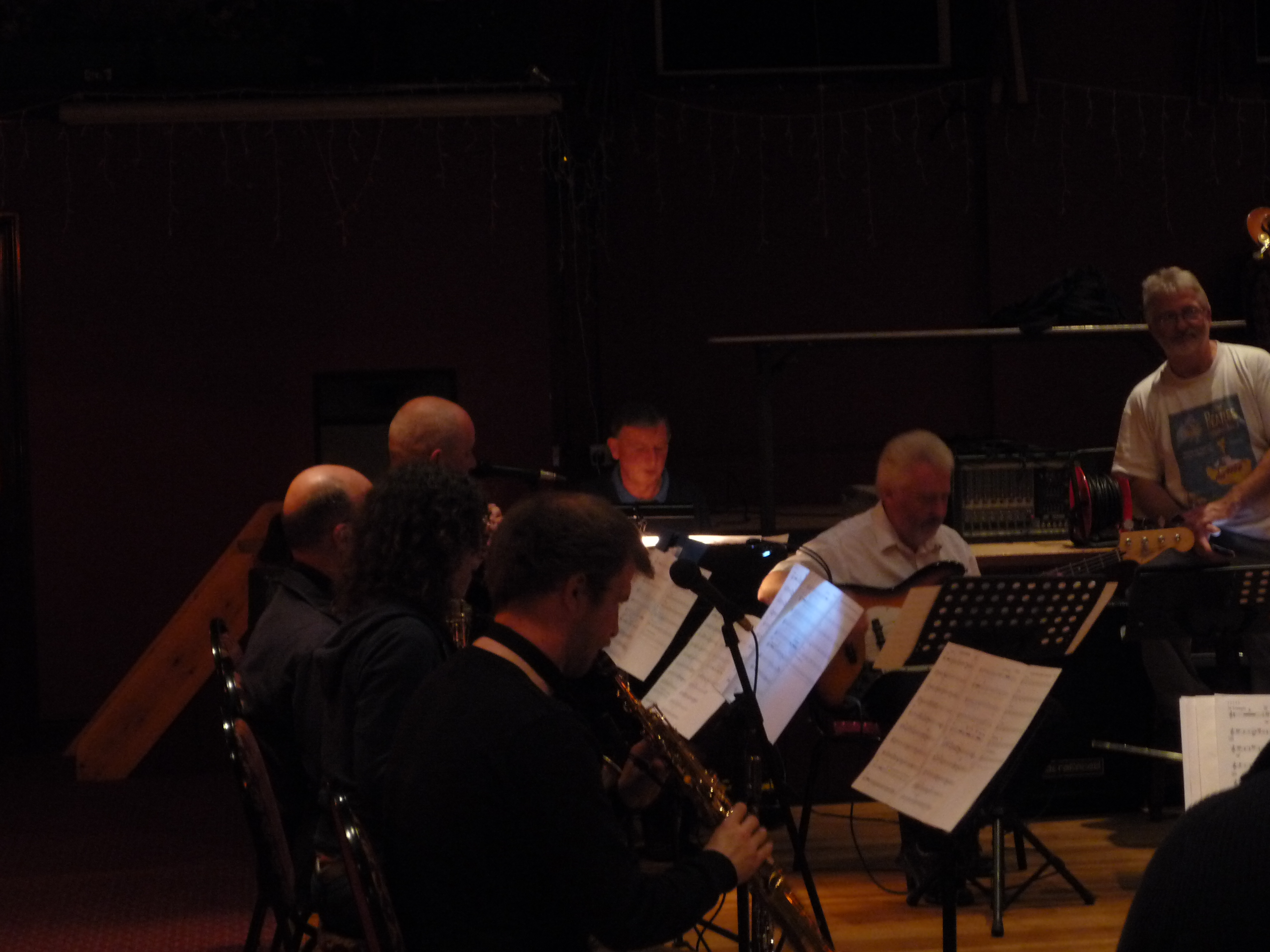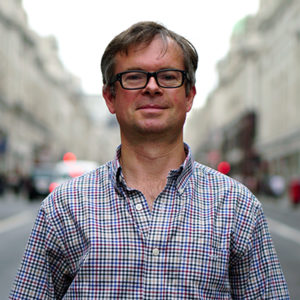Paul Busby Interview

How did you first get into playing jazz?
“At school I took piano lessons. At seventeen or eighteen I listened to Oscar Peterson and Errol Garner and then Bill Evans. Anybody who hears Bill Evans is influenced by Bill Evans. That was a big thing for me.”
“Then I went to music college in London and then took a job straight away with a band touring American bases in Germany. A four-piece band. That was when I started writing really. I took a lot of the arrangement and wrote out pretty much the whole thing. And then various other jobs came like summer seasons and residencies.”
“I spent a lot of time in the West Indies–over two years on the boats there with a Jamaican band.”
“Then I gave up music and took a degree in geography. That’s why I came to Sussex. I found that the only thing I could do as a 29-year-old mature student, I drifted back into music slowly, very gradually because it’s awfully difficult if you move from a new town.”
“Since being in Sussex I’ve been involved in small groups and commercial function bands and quite a few big bands. The first big band was Freddy Wood’s band in Horsham. I was with them for five years. And then Ian Hamer’s Sussex Jazz Orchestra. I stayed there for quite a few years, then left and went back. When Ian died I took it over for a couple of years. Ian was a big help to me and he really encouraged me to write.”
“When I was with Ian there was a new band formed called People With Instruments which I did some writing for and played piano. That was a fairly short-lived band, about a year and a half. Then I went back to stay with Ian for a while. Then in 2009 I was approached by Watermill Jazz Club to write a suite for them. So I did The Watermill Jazz Suite which was performed in 2010. That seemed to go down fairly well. Then I did The Brighton Jazz Suite with the same band. And then,latterly, The East Sussex Jazz Suite.”
What got you interested in big bands specifically? Did you listen to big bands when you were younger?
“I didn’t really much like big bands, I still don’t like them very much. The big, brassy American bands didn’t appeal to me because I’d grown up listening to Bill Evans, Miles Davis and Gil Evans. So that didn’t really make me want to write for big bands. Not until I heard the Gerry Mulligan big band and then, more importantly, the Thad Jones/Mel Lewis band. That really got me going, wanting to write…and lately Maria Schneider.”
Do you find it a bit of a struggle, organising a big band, getting gigs and so on?
“I do, in fact this next gig is probably going to be the last one for the band. There are three reasons why it’s such a struggle. One is the money side of things. A lot of people think that big bands folded because of the money period, but it’s a lot more involved than that. I believe that if somebody plays on a gig they have to paid.”
“I tend to write all my own stuff if I can. I spend hours and hours, day after day writing new stuff for a gig and then at the gig you get about twenty people or so. And I think ‘Hello, I’ve just spent six months writing all this stuff for twenty people and it’s now forgotten and it’s going to lie in a drawer and never be heard again.’ It’s a bit discouraging. I guess that applies to all big arrangers unless they become ‘names’.”
“The other thing is the gig situation. You obviously have to have rehearsals and very often a musician will have a gig on that
day or even on the day of the gig itself. Obviously, I understand that you’ve got to take the gig if you’re a musician because it’s one of the lowest-paid occupations there is. So they take their gigs which means there’s the hassle of trying to find someone else to do it. Fortunately I’ve been okay. People I’ve phoned to do a rehearsal haven’t said “Well, why aren’t I on the gig?” You can get that feeling and I’ve had that feeling myself sometimes. It is a lot of hassle, especially being let down at the last moment. You can’t always call someone and say “Can you do a gig tonight?”
“Putting on the gigs themselves and finding established gigs….The Brunswick is very useful because I can get a gig there and they put on big bands and they’re very good there. The Watermill has given me two gigs, otherwise it’s finding your own gigs and the expense of that is prohibitive. I did one at All Saints Church in Hove and hiring the place alone was about £320 and then all the other expenses. I ended up being £700 out of pocket. So, all in all, each year it can add up to many hundreds of pounds that you’re out of pocket. If you haven’t got the money coming in, you just can’t afford to do it.”
“Posters and publicity is the other problem. Years ago you could take a poster into a shop and they would put it up for you. Nowadays very few do that. And the media haven’t been very helpful at all. When I did The Brighton Jazz Suite I had Barnaby Dickenson down from London–a phenomenal trombone player. I had the Mayor coming to see it with her husband. And it was The Brighton Jazz Suite, all about Brighton. I advertised and sent press releases to The Argus and other media. And The Argus came back to me and said that they didn’t mention it because it wasn’t newsworthy. So, how do you win?”
“And trying to get people into gigs, it’s very difficult. People do expect, when they see it, American swing bands (like Glenn Miller or Sammy Nestico) but they don’t expect anything more than that. The way I’ve got round it myself, is to do suites. The first one was The Watermill Jazz Suite. I was commissioned to write that so it gave me a hint on what to do. So I did it on Dorking.”
“The next one was Brighton so I took aspects about Brighton and wrote music about them. It was almost programme music in classical music terms. So there was one about Martha Gunn in which I tried to imitate the waves with a rippling bass line and so on. That gave me ideas. It was also useful because I could give a spiel on each number before we played it, and get the audience to use their imagination. I can get away with playing 100% original music if I introduce it in a way that people can suddenly visualise what I’m talking about.”
How do see the future of big bands?
“I think there are some big bands that are doing very well, particularly in Germany, the NDR and the WDR. I’ve seen videos of them with absolutely packed venues. And they’re doing something right. I think it’s partly because it’s in Germany and not Britain (as Britain is more pop-oriented). The future, I think, lies in trying to do what they’re doing which is assimilating some of the pop influences, like having straight-eighths, guitars, different sorts of chord sequences and a different approach from the traditional big band approach. And getting the saxes to double on woodwinds. A more modern sound is soprano saxes and flutes rather than just the five saxes which sounds a bit dated. Some people say you should have vocalists but I try to avoid that! All the attention goes on the vocalist rather than the musicians who accompany them.”
“One thing I ought to say, I was getting a bit fed up with all the attention being on American swing bands and not on British ones. There’s that old joke that there’s never been a tune called ‘Moonlight In Basingstoke’ and that sort of thing. But you can use British things and what I’ve tried to do is to get away from the American influence so much and try to get more of the British or continental influence. It’s a little bit more introvert I think, apart from Maria Schneider who’s almost European, compared to Woody Herman. It means more classical influences such as Vaughan Williams and Elgar, just to get a different sound, which I think is important.”
Interview conducted by Charlie Anderson at The Verdict, Brighton.



